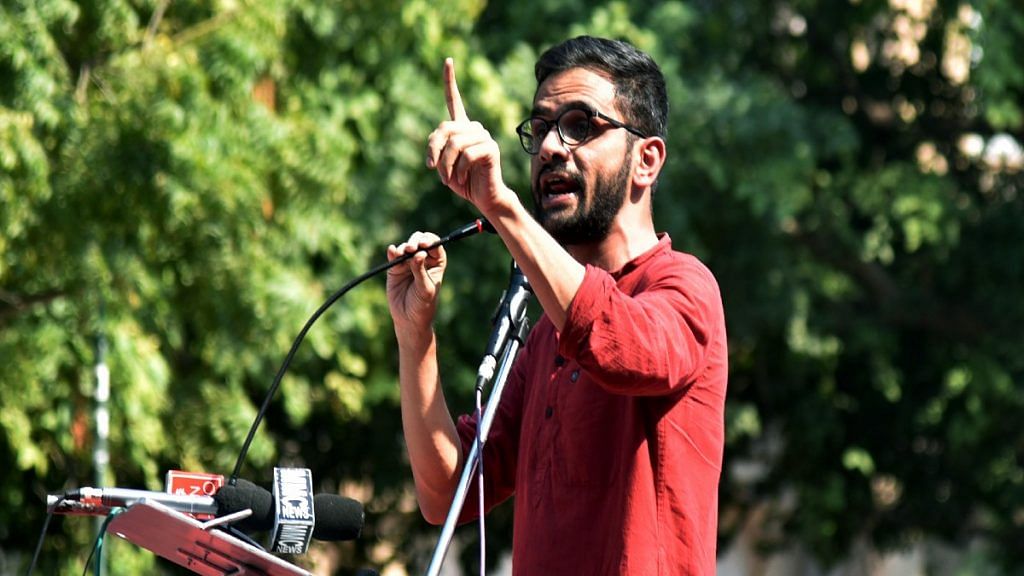New Delhi: Were the protests against the Citizenship Amendment Act (CAA) and National Register of Citizens (NRC), and the communal riots in north-east Delhi in February 2020 a “terrorist act”? Two Delhi High Court benches differ in opinion.
The two benches deciding the bail for the accused in the February 2020 Delhi riots conspiracy case have differing views on whether the allegations classify as a “terrorist act”. Their disagreement stems from their definition of the term.
The FIR no. 59/2020, which was filed on 6 March, said that the “riots that took place in Delhi were a pre-planned conspiracy”. Since then, the prosecution has alleged that the protests against the CAA/NRC in Delhi led to various “intermittent violent activities” in the capital and finally “ended with riots” in Delhi in February 2020.
The HC judgments granting bail to Pinjra Tod activists Devangana Kalita and Natasha Narwal, and Jamia Millia Islamia student Asif Iqbal Tanha — who were booked under the Unlawful Activities (Prevention) Act (UAPA), in June last year — had asserted that even if it is assumed that the inflammatory speeches, chakka-jams (blockading), and instigation of women protesters in this case crossed the line of peaceful protests, they would not amount to a “terrorist act”.
However, the judgment denying bail to former Jawaharlal Nehru University Students’ Union (JNUSU) leader Umar Khalid, also booked under UAPA, Tuesday has asserted that the protests and the riots would prima facie be covered by the definition of “terrorist act”, explaining: “The attack on police personnel by women protesters in front, only followed by other ordinary people and engulfing the area into a riot is the epitome of such pre-mediated plan and as such the same would prima facie be covered by the definition of ‘terrorist act’.”
Section 15 of the UAPA defines a “terrorist act”. It includes acts done with the intent to threaten the security of the country or to strike terror in people. Among other things, these acts can involve bombs, explosive substances, lethal weapons, etc, that can cause death, damage to property, or disruption of essential services/supplies.
While the three separate but similar judgments in Tanha, Narwal and Kalita’s case were passed by a bench comprising Justices Siddharth Mridul and Anup J. Bhambhani, the judgment in Umar Khalid’s bail application was passed by a bench comprising Justices Mridul and Rajnish Bhatnagar. Justice Mridul was common in all the cases, but the judgments were authored by the second judges on the bench.
However, on 18 June, two days after the judgment in Kalita, Narwal and Tanha’s case, the Supreme Court had intervened saying that the high court’s orders were “surprising”.
The court had then directed that these orders shall not be treated as a precedent in any other case or relied upon in any court proceeding. The order was passed on appeals filed by the Delhi Police against the bail orders. The apex court had clarified that the three activists, who had been released from prison by then, would remain out on bail.
Also Read: Words like ‘achhe din’ used at Elgar Parishad to stoke hate: What HC said in Jagtap bail denial
‘Not a typical protest’
During the hearing, Khalid’s lawyer Senior Advocate Trideep Pais had argued that ‘terrorist act’, as defined under Section 15 of the UAPA, was not made out in the present case.
He had referred to Supreme Court judgments which have held that merely causing disturbance of law and order would not amount to a ‘terrorist act’. He had also submitted that a terrorist act includes activities which cannot be handled under ordinary criminal law by a law agency, and which causes fear in a large section of people.
However, in response, the court noted that if the evidence before it is taken at face value, “there appears to be a premeditated conspiracy for causing disruptive chakka-jam and pre-planned protests at different sites in Delhi, which was engineered to escalate to confrontational chakka-jam and incitement to violence and culminate in riots in natural course on specific dates.”
It asserted that the protest planned was “not a typical protest normal in political culture or democracy but one far more destructive and injurious geared towards extremely grave consequences”. It added that there was an intentional blocking of roads causing inconvenience and disruption of essential services in north-east Delhi, creating panic and a sense of insecurity.
Also Read: News watchdog slams ‘media trial’ of Umar Khalid, orders Zee, India TV, Aaj Tak to remove videos
‘Unpersuaded and unconvinced’
However, in the orders granting bail to Kalita, Narwal and Tanha, the high court had explained how terrorism is different even from “conventional, heinous crime”.
It had relied on SC verdicts to point out that “the extent and reach of terrorist activity must travel beyond the effect of an ordinary crime and must not arise merely by causing disturbance of law and order or even public order”.
The high court had also emphasised on the right to protest, and in the order granting bail to Tanha, had asserted that “the foundations of our nation stand on surer footing than to be likely to be shaken by a protest, however vicious, organised by a tribe of college students or other persons, operating as a coordination committee from the confines of a University situate in the heart of Delhi (sic).”
While the prosecution had argued that this wasn’t a “typical protest but an aggravated protest”, the court said that it was “unpersuaded and unconvinced”.
In the order granting bail to Kalita, the court had further asserted that it is not uncommon for protesters to push the limits permissible in law. It said, “The making of inflammatory speeches, organising chakka-jams, and such actions are not uncommon when there is widespread opposition to Governmental or Parliamentary actions.”
(Edited by Theres Sudeep)
Also Read: ‘Wage war on terrorism but follow procedure’: What HC said as it quashed GN Saibaba’s conviction
